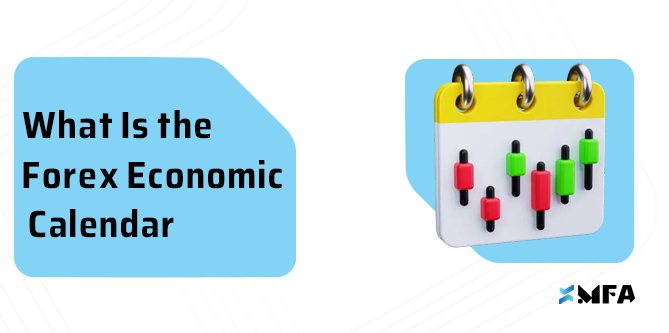Introduction | When a Single News Event Can Shake the Market
In the forex market, it’s not just the charts that move the prices — sometimes, a single sentence from a central bank official or an economic report is enough to send a currency pair hundreds of pips up or down.
That’s exactly where the economic calendar comes in — it shows you when important news is released, how impactful it might be, and what effect it could have on the market.
In this article from the MFA Fundamental Series, you’ll not only learn what an economic calendar is, but also how to use it in combination with MFA’s analytical and news-based signals to make more accurate trading decisions.
What Is the Economic Calendar? | A Tool for Forecasting Market Shocks
The economic calendar is a time-based table that lists the exact release times of impactful economic data, official speeches, and key reports.
Each news item typically includes three important pieces of information:
• Time of release
• Market forecast
• Actual result
These help traders anticipate volatility and prepare their strategy ahead of time.
Which News Events Are Most Important?
| News Event | Short Description | Market Impact |
| NFP (Non-Farm Payrolls) | U.S. employment data | Very High |
| Interest Rate Decisions | Central bank policy rates | Very High |
| CPI (Consumer Price Index) | National inflation rate | High |
| GDP | Country’s economic growth | Medium to High |
| Central Bank Speeches | Policy guidance from figures like Powell or Lagarde | Very High |
How to Use the Economic Calendar – Step by Step
1. Set Your Time Zone
Adjust the calendar to match your local time so you can follow releases accurately.
2. Filter for High-Impact News
Focus only on the most important news events (usually marked in red).
3. Check the Related Currency Pair
For example, USD news can directly impact EUR/USD, GBP/USD, and XAU/USD.
4. Compare Actual vs. Forecast
• If Actual > Forecast, the effect is usually bullish.
• If Actual < Forecast, the effect tends to be bearish.
However, always remember: the market doesn’t always react logically!
5. Avoid or Prepare for Trading During News
During major releases, spreads increase and volatility spikes. Either avoid trading or have a specialized plan for such scenarios.
How MFA Helps You Use the Economic Calendar
MFA news signals help traders:
• Before the news: Identify potential entry or exit zones
• During the news: React quickly using real-time alerts
• After the news: Understand price behavior and refine your response
The biggest advantage? You don’t need to analyze every release yourself — MFA delivers a summary and signal in real-time.
Pro Tips for Using the Calendar Like a Pro
• In lower timeframes like M5, news volatility can be extreme.
• Slippage is common during news events — manage risk accordingly.
• The economic calendar isn’t just for fundamental traders. Even technical traders need to know when not to trade.
FAQs
What’s the best economic calendar?
Websites like Forex Factory, Investing.com, and Myfxbook offer great tools — but MFA includes a built-in calendar dashboard for clients.
Should I trade every news event?
Not necessarily. Sometimes, the smartest decision is to observe and wait.
What if a news result contradicts my analysis?
If you don’t have a plan in place, it’s better to exit. One news release can invalidate all your technical setups.
Conclusion | The Economic Calendar Is a Trader’s Third Eye
If you’re aiming for professional trading, ignoring the economic calendar makes your journey harder.
Combining accurate economic timing with MFA signals and a personal trading plan gives you an edge in both calm and volatile markets.
Every trader who understands the difference between “before the news” and “after the news” gains more control and confidence — and ultimately, better results.

